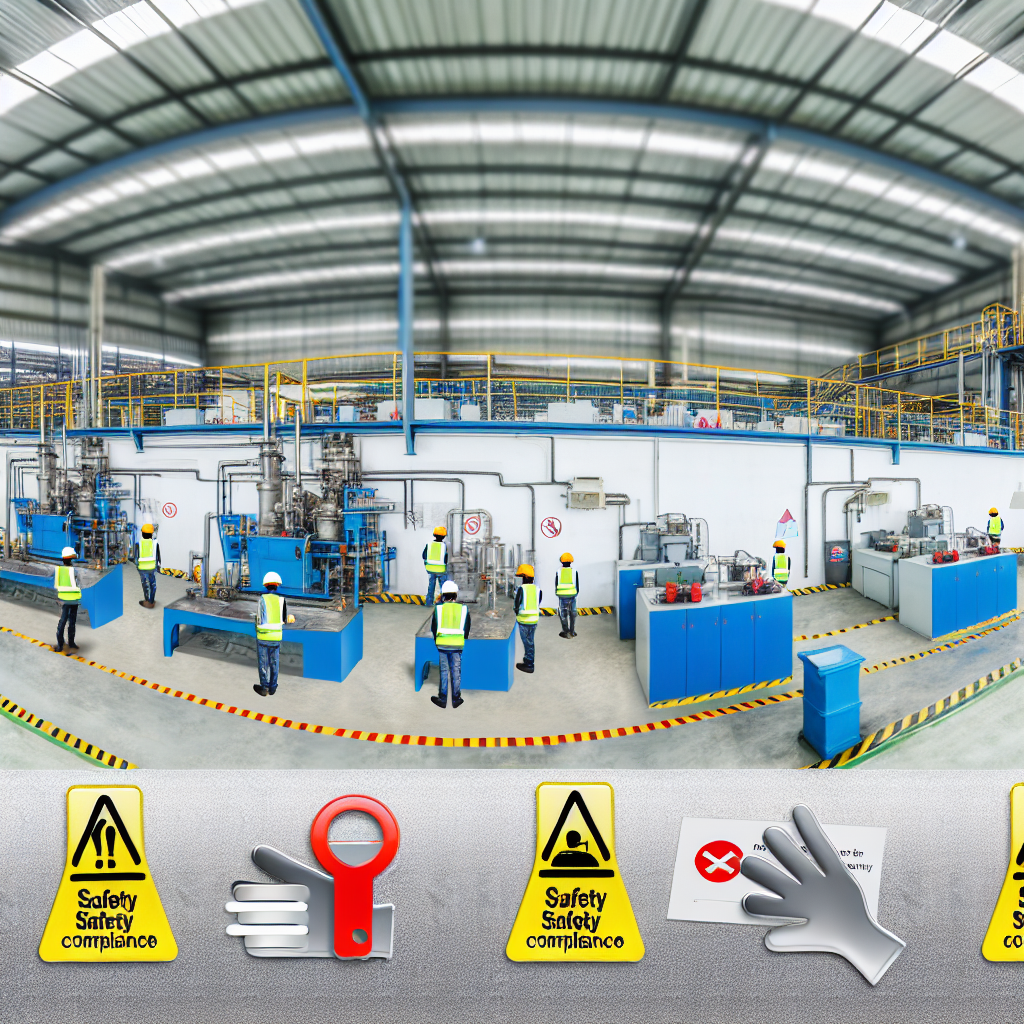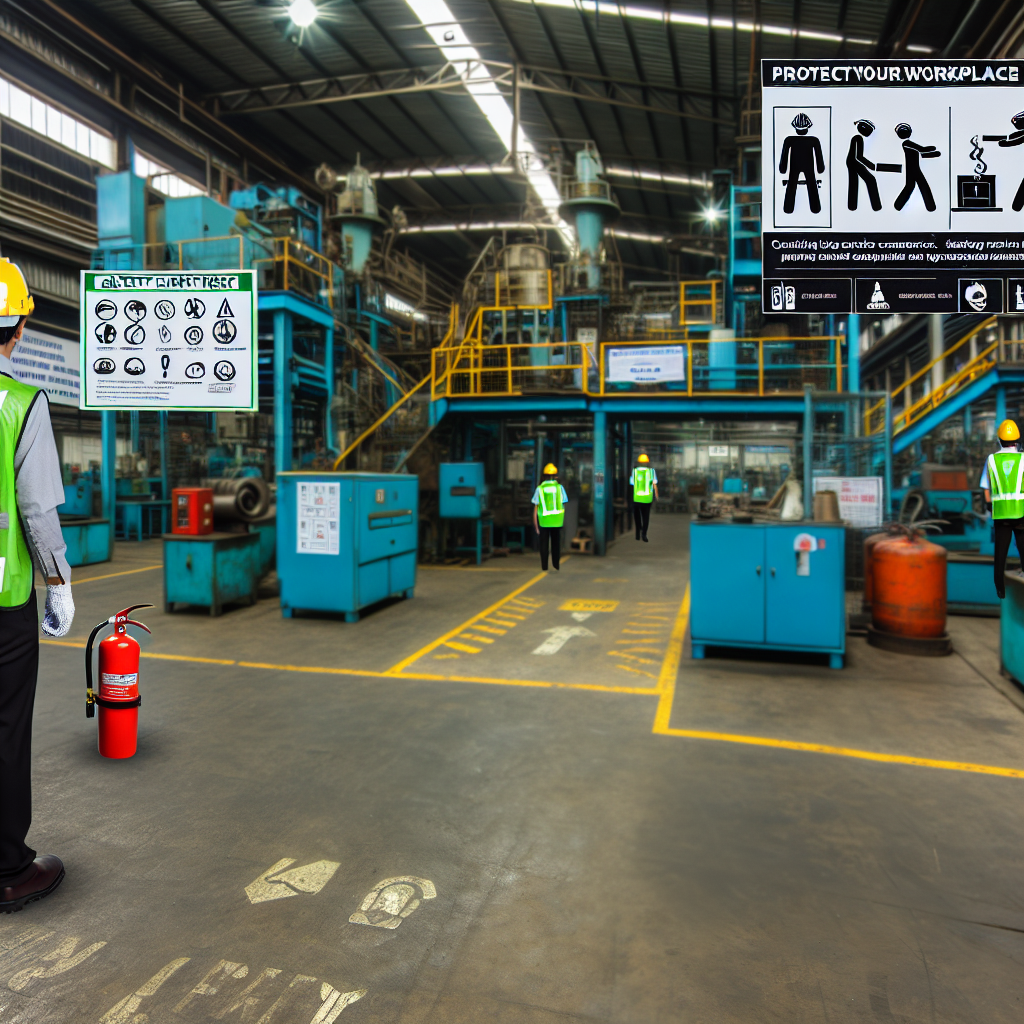“Ensure the safety of your workplace and employees by prioritizing industrial safety. Stay compliant with regulations and prevent hazards with our professional services. Request a free quote from AmericanSPD today and take the first step towards a safer and more secure workplace.”
Request a free quote from AmericanSPD today
The Importance of Industrial Safety in Hazard Management
Industrial safety is a crucial aspect of hazard management and safety compliance in any workplace. It refers to the measures and protocols put in place to ensure the physical well-being and protection of workers in industrial settings. These settings can include factories, construction sites, warehouses, and other manufacturing facilities. The importance of industrial safety cannot be overstated, as it not only protects the workers but also ensures the smooth operation of the business.
One of the main reasons why industrial safety is critical for hazard management and safety compliance is to prevent accidents and injuries. Industrial settings are often filled with potential hazards, such as heavy machinery, chemicals, and high-risk tasks. Without proper safety measures in place, workers are at risk of getting injured or even losing their lives. This not only has a devastating impact on the workers and their families but also on the company’s reputation and financial stability.
Moreover, industrial safety is essential for maintaining compliance with safety regulations and standards. In most countries, there are strict laws and regulations in place to ensure the safety of workers in industrial settings. These regulations cover various aspects, such as the use of personal protective equipment, proper training, and regular safety inspections. Failure to comply with these regulations can result in hefty fines, legal consequences, and even the closure of the business. Therefore, industrial safety is critical for companies to avoid legal and financial repercussions.
Another crucial aspect of industrial safety is its role in promoting a positive work culture. When workers feel safe and protected in their workplace, it creates a sense of trust and loyalty towards the company. This, in turn, leads to increased productivity and job satisfaction. On the other hand, a workplace with a high rate of accidents and injuries can create a negative work environment, leading to low morale and decreased productivity. By prioritizing industrial safety, companies can foster a positive work culture and improve employee satisfaction.
Furthermore, industrial safety is essential for hazard management. Hazard management refers to the identification, assessment, and control of potential hazards in the workplace. By implementing proper safety measures, companies can prevent or minimize the risks associated with these hazards. This not only protects the workers but also reduces the chances of accidents and injuries, leading to a more efficient and productive workplace.
In addition to preventing accidents and injuries, industrial safety also plays a crucial role in emergency preparedness. In industrial settings, emergencies such as fires, chemical spills, and natural disasters can occur. Without proper safety protocols in place, these emergencies can quickly escalate and cause severe damage. However, with proper safety training and emergency response plans, workers can be prepared to handle these situations effectively, minimizing the impact on both the workers and the business.
Moreover, industrial safety is not just limited to the physical well-being of workers but also includes their mental health. In high-risk industrial settings, workers may experience stress, anxiety, and other mental health issues due to the nature of their work. By promoting a safe and healthy work environment, companies can also prioritize the mental well-being of their employees.
In conclusion, industrial safety is critical for hazard management and safety compliance in any workplace. It not only protects the workers but also ensures compliance with safety regulations, promotes a positive work culture, and plays a vital role in emergency preparedness. Companies must prioritize industrial safety to create a safe and healthy work environment for their employees, leading to a more efficient and successful business.
Understanding Safety Compliance in the Workplace

Industrial safety is a crucial aspect of any workplace, especially in industries that involve hazardous materials or processes. It refers to the measures and protocols put in place to prevent accidents, injuries, and illnesses in the workplace. These safety measures are not only important for the well-being of employees but also for the overall success and productivity of a company. In this article, we will delve into the importance of industrial safety and its role in hazard management and safety compliance.
First and foremost, industrial safety is critical for the protection of employees. In any workplace, there are potential hazards that can cause harm to workers. These hazards can range from physical dangers such as machinery and equipment to chemical hazards like toxic substances. Without proper safety measures in place, employees are at risk of getting injured or even losing their lives. This not only has a devastating impact on the individual but also on their families and the company as a whole. By implementing industrial safety protocols, companies can ensure the well-being of their employees and create a safe working environment.
Moreover, industrial safety is essential for hazard management. Hazards are present in every workplace, and it is the responsibility of the company to identify and manage them effectively. This involves conducting risk assessments, implementing safety procedures, and providing appropriate training to employees. By doing so, companies can prevent accidents and minimize the impact of any potential hazards. This not only protects employees but also safeguards the company’s assets and reputation. Failure to manage hazards can result in costly lawsuits, damage to equipment, and a decline in productivity.
In addition to protecting employees and managing hazards, industrial safety is also crucial for safety compliance. Compliance refers to following laws, regulations, and standards set by governing bodies. In the workplace, this means adhering to safety regulations and standards set by organizations such as the Occupational Safety and Health Administration (OSHA). These regulations are in place to ensure the safety and well-being of employees. Companies that fail to comply with these regulations not only put their employees at risk but also face legal consequences. By prioritizing industrial safety, companies can ensure compliance and avoid penalties and fines.
Furthermore, industrial safety is vital for the overall success and productivity of a company. When employees feel safe and secure in their workplace, they are more likely to be motivated and productive. On the other hand, a workplace with a high risk of accidents and injuries can lead to low morale and decreased productivity. By implementing safety measures, companies can create a positive work environment and foster a culture of safety. This not only benefits employees but also has a positive impact on the company’s bottom line.
In conclusion, industrial safety is critical for hazard management and safety compliance in the workplace. It not only protects employees but also safeguards the company’s assets and reputation. By implementing safety protocols, companies can create a safe working environment, manage hazards effectively, and ensure compliance with regulations. Moreover, industrial safety contributes to the overall success and productivity of a company. It is the responsibility of every company to prioritize industrial safety and create a culture of safety in the workplace.
Meeting OSHA Standards: The Role of Industrial Safety in Protecting Workers
Industrial safety is a critical aspect of hazard management and safety compliance in the workplace. It refers to the measures and protocols put in place to ensure the safety and well-being of workers in industrial settings. These settings can include factories, warehouses, construction sites, and other workplaces where heavy machinery and hazardous materials are present.
The importance of industrial safety cannot be overstated. It not only protects workers from potential accidents and injuries but also ensures compliance with Occupational Safety and Health Administration (OSHA) standards. OSHA is a federal agency that sets and enforces safety and health regulations in the workplace. Failure to comply with these regulations can result in hefty fines and penalties for employers.
One of the main reasons why industrial safety is critical for hazard management and safety compliance is the high-risk nature of industrial work. Workers in these settings are exposed to a variety of hazards, including heavy machinery, chemicals, and high noise levels. Without proper safety measures in place, these hazards can lead to serious injuries or even fatalities.
Industrial safety protocols are designed to prevent accidents and injuries from occurring in the first place. This includes providing workers with personal protective equipment (PPE) such as hard hats, safety glasses, and gloves. PPE is essential in protecting workers from physical hazards such as falling objects, chemical spills, and electrical shocks.
In addition to PPE, industrial safety also involves regular maintenance and inspection of equipment and machinery. This ensures that they are in good working condition and reduces the risk of malfunctions or breakdowns that could lead to accidents. Proper training for workers on how to operate machinery and handle hazardous materials is also crucial in preventing accidents.
Another important aspect of industrial safety is the implementation of safety protocols and procedures. These protocols outline the steps to be taken in case of an emergency or accident. They also include guidelines for handling hazardous materials and operating machinery safely. Regular safety drills and training sessions are necessary to ensure that workers are familiar with these protocols and can respond appropriately in case of an emergency.
Aside from protecting workers, industrial safety also plays a significant role in ensuring compliance with OSHA standards. OSHA has strict regulations in place to protect workers from hazards in the workplace. Employers are required to provide a safe and healthy working environment for their employees, and failure to do so can result in penalties and fines.
Compliance with OSHA standards not only protects workers but also benefits employers. A safe working environment leads to increased productivity, reduced absenteeism, and lower healthcare costs. It also helps to maintain a positive reputation for the company, which can attract top talent and improve customer trust.
In conclusion, industrial safety is critical for hazard management and safety compliance in the workplace. It not only protects workers from potential accidents and injuries but also ensures compliance with OSHA standards. Employers must prioritize industrial safety by implementing proper safety protocols, providing necessary training and PPE, and regularly inspecting equipment. By doing so, they can create a safe and healthy working environment for their employees and avoid costly penalties for non-compliance.


